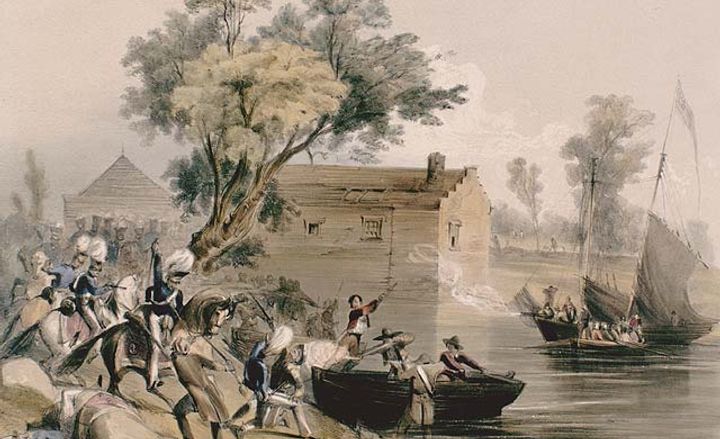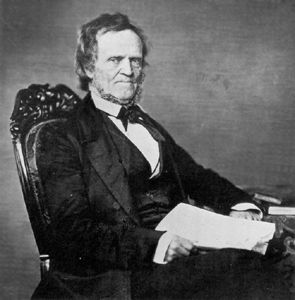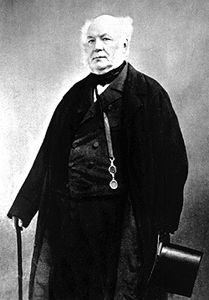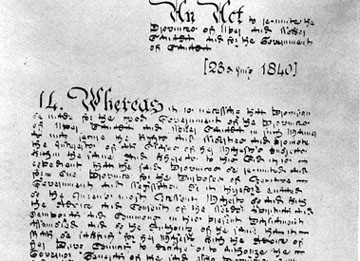Rebellion in Upper Canada
The 1837 rebellion in Upper Canada was a less violent, more limited affair than the insurrection that same year in neighbouring Lower Canada, although its leaders, including William Lyon Mackenzie, were no less serious in their demands for democratic reform, and an end to the rule of a privileged oligarchy.

-
March 12, 1795

People
Birth of William Lyon Mackenzie
William Lyon Mackenzie, a central and controversial figure in pre-Confederation political life, was born at Dundee, Scot.
-
February 19, 1798

People
Birth of Sir Allan Napier MacNab
Politician Sir Allan Napier MacNab was born in Newark, Upper Canada. MacNab’s politics shifted from moderate conservatism to extreme by the 1837–38 rebellions. His knighthood was based on his suppression of the rebellions.
-
May 12, 1804
People
Birth of Robert Baldwin
Lawyer, politician and office-holder, Robert Baldwin was born in York (Toronto), Upper Canada. With Sir Louis-Hippolyte LaFontaine, Baldwin led the first responsible government in Canada.
-
June 08, 1826

People
Mackenzie's Office Raided
Members of the Family Compact raided the offices of William Lyon Mackenzie's newspaper, the Colonial Advocate, at York.
-
January 01, 1832

People
W.L. Mackenzie Re-elected
William Lyon Mackenzie was re-elected 119 votes to 1 after having been expelled from the Upper Canada Assembly for the fifth time.
-
December 05, 1837

Battles
Rebellion in Upper Canada
William Lyon Mackenzie led a rag-tag contingent of 800 men down Yonge Street toward Toronto. Government loyalists dispersed the rebels with a few shots, ending Mackenzie's erratic attempt to overthrow the colonial government.
-
December 07, 1837

Battles
Montgomery's Tavern
About 1000 government loyalists marched from Toronto to Montgomery's Tavern, where they easily routed Mackenzie's rebels.
-
December 07, 1837
People
John A. Macdonald and the Rebellion of 1837
John A. Macdonald's early professional career coincided with the rebellion in Upper Canada and subsequent border raids from the US. He was in Toronto in December 1837 where, as a militia private, he took part in the attack on the rebels at Montgomery's Tavern. In 1838, he attracted public notice by defending accused rebels, including Nils von Schoultz, leader of an attack on Prescott.
-
December 11, 1837
Battles
Corps of Negroes
In the early 19th century, few Upper Canada militia units included Blacks. When the Mackenzie Rebellion broke out, the government welcomed Black men into the provincial forces. On 11 December 1837, a militia order authorized Captains Thomas Runchey and James Sears to raise a "corps of Negroes." Four days later, approximately 50 Blacks had joined the corps.
-
December 29, 1837

Battles
Caroline Destroyed
A force of Upper Canadian militia found the Caroline moored at Schlosser and set it ablaze and then adrift over Niagara Falls.
-
March 06, 1838
Battles
Blacks in Upper Canada Publicly Praised
In the spring of 1838, Lieutenant-Governor Sir Francis Bond Head addressed the legislature to publicly praise Black Upper Canadians for their loyalty and service during the recent rebellions.
-
March 30, 1838

Politics
Durham Appointed
The Earl of Durham was appointed governor-in-chief of British North America and commissioner to investigate the causes of the rebellions. He served from May 29 to November 1.
-
April 12, 1838
People
Lount and Matthews Hanged
Samuel Lount and Peter Matthews were hanged for treason, at Toronto, for their roles in the Rebellion of 1837.
-
November 12, 1838
Battles
Battle of the Windmill
Colonel Nils Von Schoultz ran the schooner Charlotte aground some miles below Prescott, and took up a position in a windmill and several stone houses nearby. Canadian militia pounded the windmill and resistance collapsed on November 16.
-
July 23, 1840

Politics
Act of Union Assent
The Act of Union joining Upper and Lower Canada received royal assent in England. It came into effect on 10 February 1841.
-
February 10, 1841

Politics
Act of Union in Effect
The Act of Union came into effect, uniting Upper and Lower Canada into the Province of Canada, a legislative union with 84 members divided equally between Canada East and Canada West.
-
August 08, 1862

People
Death of Sir Allan Napier MacNab
Politician and soldier Sir Allan Napier MacNab died in Hamilton, Canada West. As a teenager, MacNab fought in the War of 1812. Before becoming an esteemed politician, MacNab tried his hand at acting, carpentry and land speculation.
